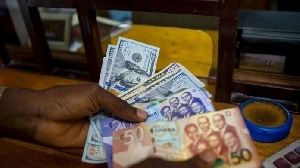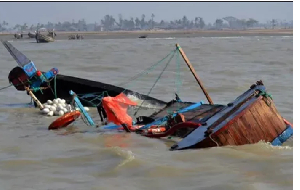– Is it in the Ghana’s Development?
Air, water, food and shelter define some of the basic necessities of life. Air is free however; water, food and shelter are not. It can be argued that water, food and shelter are also free because one can drink directly from a well, lake, river, etc; find food in the wild to eat; and pick wood and leaves to create a shelter. However, quality water, its constant availability and distribution makes water not free; in addition, specific, high yield and constant availability of food makes food not free. Moreover, laws and policies are put in place to safeguard water, food and air from being polluted to threaten our very existence; indirectly they are not free because we pay taxes. Hence, if water, air, food and/or shelter are destabilized, it destabilizes people and the development of a nation. I believe for a country to go forward the basic requirement of life; air, water, food and shelter should be available for people to be comfortable in order to develop and progress.
This article presents some information on problems faced by some tenants and landlords, possible impacts on families especially children, impacts on Ghana’s development and some suggestions to make the situation bearable. Although, my suggestions might not be the best, identifying, quantifying and addressing the need set us in the right direction.
While air, water and food are inevitable, after a hard day’s work one has to lay down comfortably in a home to rest. Note that a house may be different from a home though they are both shelters. A home is where one is comfortable and enjoys the premises. While the cost of water and food are bearable, that of shelter could be unbearable from the standpoint of building from the scratch, renting or leasing.
In Ghana, the problem with shelter and some of the unhealthy tenants - landlords relationships; the sentiment of tenants wanting to break loose from the cycle of always saving money to pay the onetime huge advances (deposits) required at the end of every stipulated leasing or rental years amidst the several rules and laws given them by landlords, have resulted in indiscriminate land encroachment and disputes, haphazard buildings, and corruption. It is a natural tendency of everyone to be free.
On one hand, some landlords are thinking about how to increase the monthly rent and number of rental or lease years to reflect huge onetime monetary advances (deposits); while others living on the same premises with their tenants cannot wait to enjoy the free utilities i.e. free electricity, water, etc; and in addition make the various laws/rules to victimize some tenants. Depending on the tenant - landlord relationship some of the laws/rules may be personal, uncomfortable; some may even have no basis and are not even in any tenancy agreements. Why do various landlords want to take huge onetime advances (deposits) corresponding to large number of rental or lease years? Many say it is the peace of mind which comes with the onetime advance payment rather than collecting monthly rents which most tenants are likely to delay, postpone or not pay at all. Why do some landlords make lot of laws for some tenants? Many say protecting their property and preventing tenants from cheating, disturbing, and disrespecting other tenants, hence, promoting fairness. However, some of the laws instituted by different landlords may not be necessary, nosy, personal and not justified.
On the other hand, some tenants are thinking of how to live amicably with co-tenants as well as landlords despite the various restrictions and complications. Many are constantly thinking about how they can make the rental place or lease a home for the family. Also, some wished the onetime advance payment cycle period never got closer to figure out how to pay the next advance which could be higher. Of all, most tenants are swamped with the thoughts of when they can have their own house where their families will be happy, secured and feel at home free of laws and grudgery about which family to clean, pay or did not pay, did what…? Moreover, many tenants are sick and tired of some co-tenants and/or landlords. To some tenants, the huge onetime advance (deposits) cycle appears perpetual, hampering their development and the situation worsened by the thoughts of living unamicably with co- tenants, seems to have grips on almost everything they do. Some feel they are mentally imprisoned working for a landlord since most of the family money is spent on rent or lease. Others; the meddling, nosiness and gossiping of some co-tenants and landlords in their personal and private lives are killing them. Some tenants even have curfews imposed on them i.e. time to sleep and even wake up; many require paying utilities and doing others for the landlords which are not in the agreement which to some tenants could be burdensome and results in nightmares. In my opinion, many of these occurrences could have serious effects on kids, teens and young adults’ developments including low the self esteem, lack of confidence, rudeness and low productivity.
While the claims by tenants and landlords are true;
• What laws governs tenants and landlords?
• What are the rights of tenants and landlords?
• What rights do landlords have over tenants?
• Can government meddle in tenant - landlord agreements?
• What is the role of rent control?
• How available are the various laws or code of conducts governing tenants and landlords?
• Have some landlords or tenants taken the laws into their hands?
• How dynamics are the laws developed by rent control if any? Are these laws addressing tenancy- landlord issues since the government is not building to meet the need of the growing population? Are the laws dynamic enough to meet the demands of the growing population?
• What is the accommodation plan for Ghana in the next 5, 10 and 20 years?
• Is there any plan laid down for Ghana’s future? What priorities are set for Ghana? Or are we only allowing nature to do its thing while we rely on superstition, blame the devil, pray and always sing it shall be well (ebe ye yie) while we know the problems to address? Note that prayers with no actions mean nothing. In my view, miracles do happen but a rare occurrence which is not sporadic.
While the payment of huge onetime advances might favor some landlords, it might not favor some tenants as well as Ghana’s development in the long run. The question is; how can Ghana develop if majority of the people who are suppose to make things happen have problems with the basic necessities of life i.e. water, food and shelter? Will Ghanaians have the freedom of mind required to think about development, R&D and other long-term profitable deals while the basic necessities are not easy to come by and are pressing? Note that a sound mind in a sound body, however, a sound body requires a sound home. In that respect crippled homes produces crippled Ghanaians resulting in crippled Ghana where corruption, lies and hypocrisy are the some of the fruits. At least, the issue of water, food, and accommodation should be considered as a national issue since it is heavily linked to Ghana’s development. I believe the entire presidential candidates should add to their portfolios the basic necessities of life as fundamental for a nation’s development of which others will build or bolt on.
I believe for a country to go forward the basic necessities should be available and accessible for the growing population. Our situation in Ghana is almost the same if not being reversed because we have forgone most of the fundamentals.
• Can someone with no or scarcity of food, water and shelter be very productivity?
• Can someone exposed to constant pestering by a landlord or co-tenants be very productivity?
• Why are some Ghanaians abroad doing extremely well? Does that mean that the system in Ghana does not support growth and development? Are we always complacent? Are we truthful or do not know what we are doing? What plan is in place for Ghana in 5, 10 and 20 years to come…any plan?
A greater portion of Ghanaians rent, hence whatever affects them relating to accommodation could also affect the nation as well. What should we do to make accommodation available and bearable? While the government is not building enough and cannot build for every family; the first step in my view is to put proper win-win laws and codes for tenants and landlords in regards to accommodation amidst looking at Ghana’s overall interests. I believe these laws and codes should define the types of houses/apartments being rented or leased including dimensions, the maximum advance or deposits required, the minimum number of months/years for rental or lease, maximum amount to pay monthly, various options and, what happens if a tenant delays to pay rent on time or damages a landlord’s property among others. The various types of rental agreements or leases need to be defined for renters’ especially first timers not to fall victims since some agreements may not have conditions spelt out explicitly. Note that there is a difference between a “lease” and “rental agreement”. I believe looking at our system we can develop suitable lease or rental agreements for our situation to make accommodation bearable for Ghanaians.
How do the huge onetime advances (deposits) affect most tenants and the development of Ghana? In my opinion, money in a lot of peoples’ pocket means money available to spend i.e. making purchases, supporting, donating and/or investing in businesses, research, NGOs, etc to go on. However, paying huge onetime advances every 3 - 5 years means money needs to be saved for the next advance cycle; this affects many pockets heavily, which may affect overall spending in Ghana. However, if the maximum advance is say 6 months or less, and the rest of payment made monthly afterwards whatever the minimum stipulated years of lease, I believe that will improve spending and Ghana’s economy. In this case, young, energetic and ambitious Ghanaians will have enough money to start small businesses which could eventually grow the economy. Note that more private businesses could grow Ghana’s economy faster, and reliably than more government institutions/companies hence, avenues needs to be available for individuals to promote national growth while the government provides avenues and conditions to protect citizens. Though, the government should not meddle too much in private businesses including that of tenant-landlord agreements, in some cases it is required to safeguard the betterment of Ghana and its inhabitants.
Another pressing question on the side of landlords is how does one ensures that the tenant pays rent regularly and on time while not ruining or being responsible for ruining anything on the leased or rented property? In the situation where a tenant makes the maximum advance or deposit for a given lease and pays the rest monthly, I believe prospective tenant’s should show proof of work which includes pay slips/stubs, and letter from workplaces which landlords needs to verify including if job is permanent or temporary. In the situation where a tenant wants to make the maximum advance or deposit for a given lease and pays the rest monthly, a security deposit or agreed conditions will be necessary for events where the tenant damages a property at the end of the lease or rental period. The security deposit should be handed back either in part or full to the tenant if both the tenant and landlord agree damages or no damages at the end of the lease or rental period. Moreover, a landlord could ask for more or ask tenants to replace any property if damages are more than the security deposit. Hence, it will be necessary that a tenant moving into a new rented place inspects and document with the landlord the state of the place and sign before moving in. Taking pictures, videos and/or bringing a 3rd party as witness could help. As there are stubborn landlords so are there stubborn tenants.
In conclusion, there is a direct linked between the basic necessities of life and development. However, some of the above proposals may appear cumbersome on the side of landlords and may not represent the situation; it is how we are willing to simplify our problems to make life bearable and easier to prevent Ghanaians from being distracted with basic issues, will Ghanaians efforts be going straight to nation’s development. I believe better laws and codes could be brought up by the government while looking at the big picture and Ghana’s development such that it is a win-win situation for Ghanaians and Ghana. Finally, something needs to be done about the issue of water, food and accommodation looking at the current dynamics and population growth which in my view is holding the fabrics of Ghana. We need to be proactive rather than being reactive. We need to stop saying it shall be well (ebe ye yie) and let the situation take its course. It is necessary to stop using and coining up excuses for comfort. It does not work that way. We must set good examples and be willing to change our altitudes, be responsible and accountable. The first steps start with us. God bless.
Alexander R. Anim-Mensah, PhD
Dayton Ohio
alexraymonda@yahoo.com
Opinions of Friday, 7 December 2012
Columnist: Anim-Mensah, Alexander












